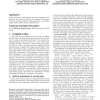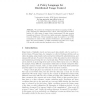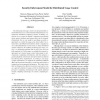DBSEC
2004
15 years 3 months ago
2004
The notion of Usage Control (UCON) has been introduced recently to extend traditional access controls by including three decision factors called authorizations, obligations, and co...
DBSEC
2007
15 years 3 months ago
2007
Abstract. Modern information systems require temporal and privilegeconsuming usage of digital objects. To meet these requirements, we present a new access control model–Times-bas...
101
click to vote
CCS
2008
ACM
15 years 4 months ago
2008
ACM
Usage control is a generalization of access control that also addresses how data is used after it is released. We present a formal model for different mechanisms that can enforce ...
121
click to vote
TRUSTBUS
2007
Springer
15 years 8 months ago
2007
Springer
Usage control governs the handling of sensitive data after it has been given away. The enforcement of usage control requirements is a challenge because the service requester in gen...
119
click to vote
ESORICS
2007
Springer
15 years 8 months ago
2007
Springer
We present the Obligation Specification Language (OSL), a policy language for distributed usage control. OSL supports the formalization of a wide range of usage control requiremen...
111
click to vote
ICC
2007
IEEE
15 years 8 months ago
2007
IEEE
—Usage control goes beyond traditional access control, addressing its limitations related to attribute mutability and continuous usage permission validation. The recently propose...
113
click to vote
SUTC
2008
IEEE
15 years 8 months ago
2008
IEEE
Recently proposed usage control concept and models extend traditional access control models with features for contemporary distributed computing systems, including continuous acce...



